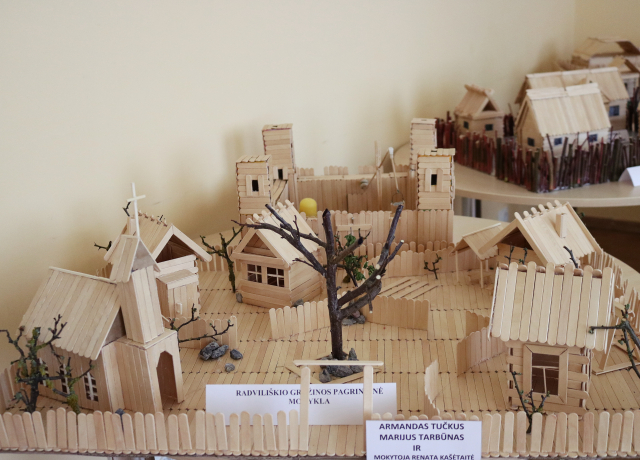European Heritage Days Article:
Recycling, Re-using and Repairing in Sustainable Heritage Events
European Heritage Days Article:
Recycling, Re-using and Repairing in Sustainable Heritage Events
Showcase the use of sustainable materials
Whether in traditional crafts or modern building techniques, sustainable practices and use of renewable or recycled materials can be seen all around us. Workshops and demonstrations of these processes are a good way to get visitors thinking about these issues. Why not explore the process of making paper by hand? Pulp can be used to make recycled paper, while natural plant-based dyes and adding pressed petals or seeds can add extra creative fun. Other workshops could ask people to bring in their own materials to create something new. For example, in Spain in 2019, children were challenged to make models of windmills by re-using items from home such as cardboard packaging; finding not only a new use for the discarded rubbish but also teaching about sustainable energy production and architecture of the past.
From older buildings to the brand new, modern development is increasingly considering sustainability. Future-oriented architecture was the basis for an event in 2020 in the Netherlands at the Kerkewijk school campus to show how re-use of the site’s existing buildings and materials were a key element in the design of the new development. The event explained how this was done, from reprocessing the concrete rubble created during demolition work, to re-using steel for the roof and even re-purposing old curtains to make bags and hammocks!
Encourage community activities and traditions
Bringing communities together is a good way to get lots of people interested and involved in events. Encourage residents to celebrate special occasions together by creating festive bunting out of unwanted clothes and fabrics which can be used to decorate their street. Repair Cafés are a community initiative where people can share their knowledge and help restore broken items so they can continue to be used rather than thrown away; team up with a local initiative to run events encouraging people to repair rather than replace. A bicycle repair workshop is a specific example which could be run as a group activity, and which could help encourage participants to make sustainable journeys in the future. Follow it up with a heritage trail bicycle tour of your local area to keep the activities going.
Discussions of cultural traditions can also be a way to connect people and encourage intergenerational dialogue. Have you heard of a ‘Living Library’? It’s an event at which visitors can ‘borrow’ people to talk to and learn about their lives and experiences with a view to promoting social inclusion. Put a sustainable twist on the idea by inviting those involved in sustainable industries or older generations who can explain how attitudes and approaches to recycling have changed over the decades. Another idea could be storytelling, such as an example from Croatia based around the folklore of the Kontići. These are small mythical creatures which act as guardians for their forest and whose hobby is to recycle the rubbish they find. Does your local area have a similar story or examples of recycling from history which could be turned into an event?
Get creative with art and upcycling
Creative events often prove popular, and household waste is a potential treasure trove of materials which can be re-used. Why not organise a craft workshop for participants to find new uses for broken or discarded objects; you could even work with an artist to hold a masterclass in making sculptures from pre-loved items. One example from this year’s Lithuanian European Heritage Days stories connected with around 100 participants to make models of the ancient settlement of Kernavė using recyclable wooden ice cream sticks. Another upcycling idea is to source an old piece of furniture and partner with a local restorer to refurbish it. Post the process and ‘before and after’ photos to social media to show others how it’s done!
Choose a recycling venue
As well as the activities taking place, there are other ways organisers can theme their events to include recycling and resource sustainability. For example, the venue itself could be a recycling plant or energy facility, providing a fascinating behind-the-scenes tour for visitors of sites they may not normally have access to. In Scotland last year, one such event included a virtual tour of the Dunbar Energy Recovery Facility to demonstrate how 325,000 tonnes of non-recyclable waste is processed each year to generate enough energy to power over 70,000 homes. In Belgium the Proper Strand Lopers citizens' initiative, which raises awareness of littering, showcased their machinery which can shred, melt and mould plastic collected locally to create new objects, while in France, glass recycling and waste reduction were highlighted by the Sorting Ambassadors, from the Nantes Métropole waste department.
Build recycling into any kind of event
It’s not just venue choice or activity which can revolve around the theme; organisers hosting any type of event can think about recycling. From early plans to re-purpose items from previous years, to choosing recycled paper for advertising materials and selecting ingredients for catering which come in recyclable packaging, there are plenty of opportunities to make sustainable choices. Visitors can also be encouraged to act responsibly by providing recycling bins, or even by providing discounts or special offers to those bringing their own re-usable mug for drinks.
Take a look at our Sustainable Heritage Brochure for more specific recycling event examples. And for more ideas about how to incorporate sustainability initiatives into any kind of event, check out our article ‘8 Top Tips for Planning Sustainable Heritage Events’.
